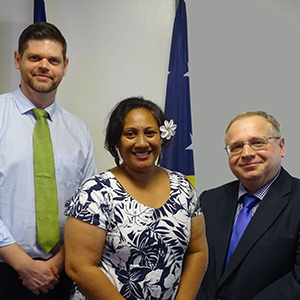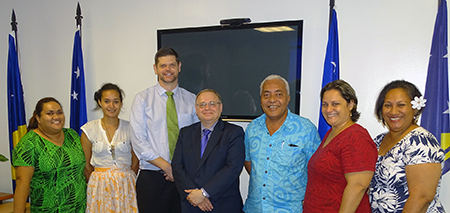Home > Bulletin > April 2016 > Legal eagles look at international law options for climate change relocation
Legal eagles look at international law options for climate change relocation
| Two international law experts from Victoria University of Wellington visited the Tokelau Apia Liaison Office (TALO) on 26 April, to discuss legal implications of climate change on inhabitants of Pacific Islands under threat. The informal talk followed their consultation with the Secretariat of the Pacific Regional Environment Programme (SPREP) in Apia earlier that day. “What international law applies in a situation where a country becomes uninhabitable?” is the question asked by Associate Professor Alberto Costi and Research Fellow Nathan Ross. Both are in the process of researching this question that has great potential relevance for Tokelau. Two aspects are particularly important: if a country is deserted because of climate change, does it cease to exist as a legal entity? There are no rules yet for countries disappearing, because what climate change may do is unprecedented. So that’s a research question that needs exploring, given that international law is designed to protect a state (rather than a country). More importantly perhaps, if a whole people had to move from one country to another, what would happen to its culture and language? Such a move would mean an instant change from a majority culture in the home country, to a minority group in the recipient country…. Every country has a “duty of international cooperation”, but what does that really mean? Costi and Ross think that every climate change document should recognise states that are especially vulnerable to climate change. |
 Tokelau Legal Adviser Lise Suveinakama flanked by Associate Professor Alberto Costi (right) and Research Fellow Nathan Ross of the Wellington Faculty of Law. |
| Tokelau is in a unique situation in that it is a territory of New Zealand. So if all Tokelauans eventually were forced to move to NZ, legally this would be more like a matter of internal relocation, the lawyers think: the United Nations has developed guidelines for that. Nevertheless the same risks of potential loss of language and culture remain. The Principles of Partnership between Tokelau and New Zealand will also be important in this discussion. Although the ‘Principles’ do not mention climate change specifically, they do provide a constitutional relationship that is absent in other countries under threat of submersion, such as Tuvalu and Kiribati. These countries are also of special interest to the Victoria University researchers. |
|
 |
Right to left: Speakers and some of the audience at the legal seminar: Ms Lise Suveinakama, Ms Margaret Sapolu, Mr Mika Perez, Prof. Alberto Costi, Mr Nathan Ross, Ms Meleka Mativa and Ms Solonaima Mei. |
